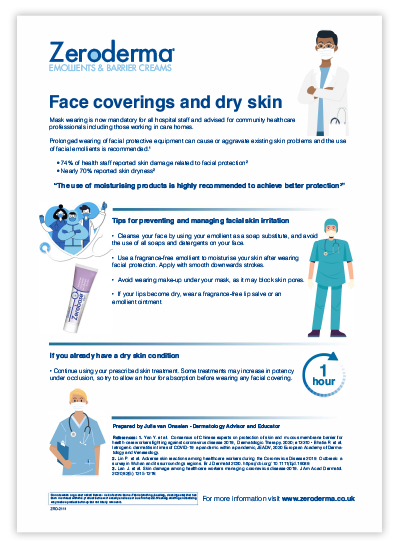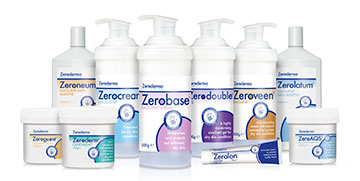Face coverings, skin conditions and healthcare workers

The whole country has applauded the efforts of NHS and Care Home staff working tirelessly throughout the pandemic. Besides the toll taken on both the physical and mental health of staff, the impact on the skin of constant infection prevention precautions should not be underestimated.
Check out Zeroderma’s handy COVID-19 skincare resources page!
Recent research from China has shown that amongst front line health workers caring for patients with COVID-19, the prevalence of skin damage caused by enhanced infection-prevention measures was 97%.1 Whilst high rates of dermatitis relating to hand hygiene procedures are widely recognised2 this study showed that the face, rather than hands, was the most frequent site of skin damage in health care workers.3 This was attributed to the increased wearing of face masks and goggles, leading to additional pressure on the facial skin. The nasal bridge was the most commonly affected area of the face, with 83% reporting skin problems in this area. Dryness, tightness and peeling, flaky skin were the most frequently reported symptoms by 70% of health staff, followed by itching described by 53%. The longer the face mask was worn, the higher the risk of skin damage1and prolonged use of PPE itself is a risk factor for adverse skin reactions.3 There have also been reports of dermatitis caused by the elastic on face masks leading to skin irritation.4
Explore the Zeroderma range of emollients
Given the potential impact of enhanced PPE measures on facial skin, it’s unsurprising that the use of facial emollients is frequently recommended to help protect the skin.5,6 Emollients should be fragrance-free and applied liberally, particularly after wearing a face covering, to help repair the skin barrier.5 Using very hot water on the face may increase irritation.6
Managing facial skin irritation

Download Zeroderma’s guide to hand-washing and dry skin!
- Cleanse your face with an emollient, as a soap substitute, and avoid the use of all soaps and detergents on your face.
- Use an emollient to moisturise your skin after wearing facial protection. Apply with smooth downwards strokes.
- The best emollients are fragrance-free medical emollients.
- If your skin feels sore, an emollient ointment may provide the most effective barrier.
- Avoid wearing make-up under your mask, as it may block skin pores.
- If your lips become dry, wear a fragrance–free lip salve or an emollient ointment.
- If you already have a dry skin condition, continue using your prescribed skin treatment. Some treatments may increase in potency under occlusion so try to allow an hour for absorption before wearing any facial covering.
It is not only dry skin conditions which are associated with facial coverings. Prolonged wearing of masks and goggles may also aggravate acne vulgaris. During the SARS outbreak in 2003, 60% of health staff with skin problems reported having acne.7 Likely reasons for this include the rupture of comedones due to pressure and friction, occlusion leading to the build-up of sebum and a humid environment being conducive to the proliferation of bacteria.6 If acne is of concern, use a gentle skin cleanser twice daily and look for active ingredients such salicylic acid or benzoyl peroxide which can help acne-prone skin.6 It is now widely accepted that prolonged wearing of facial protective equipment can cause or aggravate existing skin problems.1,3,6 Therefore spending a little time caring for your skin is likely to be highly beneficial.
References
- Lan J, Song Z, Miao X, et al. Skin damage among health care workers managing coronavirus disease-2019. J Am Acad Dermatol. 2020;82(5):1215-1216. https://doi:10.1016/j.jaad.2020.03.014
- World Health Organisation, WHO guidelines on hand hygiene in health care, 2009
- Lin P. et al. Adverse skin reactions among healthcare workers during the Coronavirus Disease 2019. Outbreak: a survey in Wuhan and its surroundings regions. Br J Dermatol 2020. https://doi.org/10.1111/bjd.19089
- Al Badri FM, Surgical mask contact dermatitis and epidemiology of contact dermatitis in healthcare workers; Current Allergy & Clinical Immunology 2017, Vol 30, No 3
- Bhatia R. et al. Iatrogenic dermatitis in times of COVID-19: a pandemic within a pandemic, JEADV, 2020 European Academy of Dermatology and Venereology
- Yan Y. et al. Consensus of Chinese experts on protection of skin and mucous membrane barrier for health-care workers fighting against coronavirus disease 2019, Dermatologic Therapy. 2020;e13310.
- Foo CC, Goon AT, Leow YH, Goh CL. Adverse skin reactions to personal protective equipment against severe acute respiratory syndrome–a descriptive study in Singapore. Contact Dermatitis. 2006; 55:291-294. https://doi.org/10.1111/j.1600-0536.2006.00953.x
